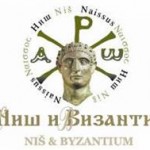
“CONSTANTINE, IN HOC SIGNO VINCES,
313 – 2013“
City of Niš ~ the birth place of Constantine the Great ~ looks forward to being the venue of the great traditional international conference “ NIŠ AND BYZANTIUM“ in the year 2013, 3 – 7 June, as XII meeting of eminent world byzantologists, this time in the sign of Constantine and the milestone in the mankind history, reflected in even nowadays actual message “CONSTANTINE, IN HOC SIGNO VINCES“.
Organizers: City of Niš, University of Niš and Niš Eparchy
International Scientific Conference “NIŠ AND BYZANTIUM XII – C?NSTANTINE, IN HOC SIGNO VINCES“ will be held with the aim of marking one of the most important dates in the history of European civilization – 1700 years of the Edict of Milan.
Organizing Board and Redaction: His Holliness Serbian Patriarch Mr. Irinej; Niš Bishop Mr. Jovan; Niš University Rector Prof. Dragan Antić, PhD; Mayor of the City of Niš Zoran Perišić, MD, PhD – president of the Board; Niš City Councilor Srđan Aleksić – deputy president of the Board; dr Miša Rakocija – editor in chief of the Proceedings “Nis and Byzantium“ (Niš); Prof. Franc Curk, PhD (Niš); Dr. Irena Ljubomirović – Secretary of the Board (Niš); Prof. Slobodan Ćurčić, PhD (Prinston); Academician Dr. Ljubomir Maksimović; Academician Dr. Cvetan Grozdanov (Skopje); Academician Dr. Renate Pilinger (Vienna), Academician Dr. Vera Bitrakova Grozdanova (Skoplje); Prof. Goran Maksimović, PhD (Niš); Prof. Branko Vujović, PhD (Belgrade); Prof. Aleksandar Kadijević, PhD (Belgrade); Prof. Hranislav Andjelković, PhD (Niš); Prof. Graham Jones, PhD (Oxford); Dr. Lars Ramskold (Stockholm), Dr. Vujadin Ivanišević (Belgrade), Prof. Miodrag Marković, PhD (Belgrade); Dr. Dragan Vojvodić (Belgrade), Prof. Radivoje Radić, PhD (Belgrade); Prof. Giordana Trovabene, PhD (Venice), Ionais Sisiou, MA (Kastoria), Prof. Georgi Gerov, PhD (Sofia), Dr. Bojana Krsmanović (Belgrade); Prof. Athansios Semoglou, PhD (Thessaloniki); Dr. Iannis D. Varalis (Volos); Prof. Martha Nagy, PhD (Debrecen), Prof. Ivanka Gergova, PhD (Sofia), Dr. Evangelia Hagitriphonos (Thessaloniki); Prof. Elizabeta Dimitrova, PhD (Skoplje); Prof. Carolyne S. Snively, PhD (Gettysburg), Dr. Ivana Popović (Belgrade); Dr. Irina Orteskaya (Moscow), Prof. Aleksandar Popović, PhD (Belgrade); Prof. Aiello Vincenzo, PhD (Mesina); Miomir Vasov, MA (Niš); Jovan Mandić, architect (Niš), Milica Todorović (Niš), Elena Vasić Petrović, architect (Niš); Aleksandar Đorđevic, reverend, Orthodox Niš Eparchy; Olgica Davidovic, Niš University Rectorate; Ana Mišić (coordinator).
The focus of interest is early-Christian, Byzantine and post Byzantine past, as well as its reflection on later spiritual creativity, culture and art of Niš, Serbia, the Balkans and Europe, along with contemporary heritage protection, monument heritage presentation and preserving Byzantine civilization achievements. This approach implies interdisciplinarity and presence of art historians, historians, architects, archeologists, clasic philologists, literature historians, theologists, philosophers….
- Please, find the application form on cliquer ici
- Application Deadline: 01.05.2013.
- Abstract is to be in Serbian or English language
- The participants are required to furnish the organizers with their respective papers together with complete scientific references by September 1, 2013
- All Europen languages are equal for paper works writting
- Paper works presentation eliglible in Serbian, English or Russian
Contact:
Ana Mišić, Mayor’s Office, 7. juli 2, 18000 Niš, Serbia, Phone/fax: +381 (0)18/504-408; e-mail: ana.misic@gu.ni.rs
dr Miša Rakocija, Institute for Cultural Monuments Protection Niš, Dobrička 2, 18000 Niš, Serbia, Phone: +381 (0)18/523-414; e-mail: mirakocija@gmail.com


